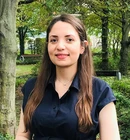Dima Al Munajed
- Gender
- Governance and conflict
- Migration, mobility and urbanization
- Turkey
- Syria
- Lebanon
BA in Political Studies from the American University of Beirut (2006)
MSc in Sustainable Development with emphasis in Rural Management from Imperial College London & SOAS (2011)
Dima has over ten years working experience in the NGO sector in Syria and Lebanon as a social researcher and project manager. Her research interests include civil society, rural development, culture as a development tool, and more recently gender and Arab feminism. She holds an MSc in Sustainable Development from the School of Oriental and African Studies in London, UK, and a B.A. in Political Studies from the American University of Beirut, Lebanon.
Participation of Syrian women in civil society organizations following the Syrian conflict: Investigating participation in Turkey and Lebanon
Ongoing conflict in Syria has led to one of the largest humanitarian crises of our time. UNHCR estimates that in 2019, 5.6 million Syrian refugees were living in neighbouring countries. In response to this crisis Syrian, local and international Civil Society Organizations (CSOs) grew in number and scope. Funded primarily by International Non-Governmental Organizations, neoliberal notions of gender equality and women empowerment have become a main feature of these CSO structures and projects. Prolonged conflict influences traditional gender roles in conflict societies, as women take on previously male-dominated activities in public spaces, and become more civically and politically engaged. Still, recent research on Syrian CSOs shows that the participation of Syrian women remains restricted to lower organizational levels. This underrepresentation in CSO leadership not only means that their perspectives are lacking in these organizations, but when considering the role civil society plays in peace negotiations and in lobbying for more gender inclusive post-war societies, that Syrian women are not able to participate effectively in these processes. Using qualitative data collected in 2018 from 80 semi-structured interviews with Syrian women and men working in various CSOs and experts from government, academic and research institutions, this research investigates the current participation of Syrian women in civil society leadership in Turkey and Lebanon. An intersectional approach derived from feminist scholarship is used to understand and compare the complexities of gender experiences of Syrian women in CSOs in both countries, and how multiple levels and sources of discrimination interact in each context preventing them from accessing leadership positions. In order to go beyond Western essentialist notions that attribute gender inequalities in Arab countries to culture and Islam, decolonial intersectionality questions the categories of oppression themselves allowing them to emerge from the cases and contexts resulting in a deeper understanding of discrimination against Syrian women in civil society leadership.
BMZ via DAAD
doctoral work
Prof. Dr. Eva Youkhana
Dr. Wolfram Laube
2020
Review
and Downloads


